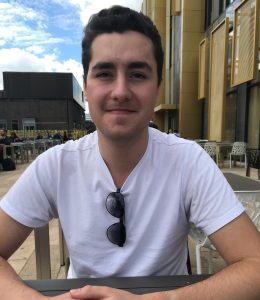
This Summer I worked with Dr Kate Skinner on her project ‘West Africa’s First Coup d’État: what can we learn from the German embassy records?’, which analysed correspondence between the West German foreign office and its embassy in the Republic of Togo, West Africa. The aims of the project were to try to build a clearer picture of the 1963 coup which overthrew Togolese president Sylvanus Olympio, and to establish if the West German government records contained important information or perspectives that had not been identified in other sources.
The project was initially daunting, as while I had already studied the Cold War during GCSE and A-level history, I knew very little about Africa and even less about Togo specifically. Fortunately, Kate was very helpful and recommended plenty of useful books and articles dealing with Togo’s history. Consequently, I felt that I had a good enough understanding to be able to contextualise any German documents upon starting the project.
My specific tasks were split into 3 stages over the five-week project. The first stage was one week of reading about both West and East Germany’s foreign policy objectives, which then progressed to a focus on development aid policy and the role it played in Cold War international relations. The latter two stages, each lasting two weeks, were spent summarising each document and then translating those that Kate highlighted as the most important.
As we came to the end of the first week, it became clear that we were handling both West and East German documents, giving us an insight not only into Togo’s political situation and West German interests, but also the success of West Germany’s attempts to isolate its East German rival internationally. This meant the project was extremely useful for me personally and gave me an idea for my upcoming dissertation. The project also produced useful results for Kate, and whilst it is currently unclear if we discovered anything new about who exactly plotted the coup, the documents provided information on other topics Kate was interested in. These included issues such as German involvement in setting up printing presses in Togo, Soviet propaganda activity in Togo, and how African countries’ ability to vote in the UN General Assembly made them valuable allies.
Throughout the project, Kate and I met once a week to discuss our findings, objectives and the information in my summaries. It initially seemed like we would not be able to exchange enough information, however, much of my work consisted of lengthy summaries which could not be covered properly in person, but rather had to be read and sent back with feedback via email. This meant that in our meetings we were able to focus on the documents and queries that were most important and discuss our work schedule.
The project also helped me develop my writing and research abilities, as I had to learn how to identify important information and summarise it concisely without changing its meaning. My translation skills also improved, as to meet our project’s deadline I had to increase the speed at which I could translate without sacrificing the quality, meaning I was able to put into practice the theories and strategies I had learnt in my translation classes. It also taught me that research requires problem-solving and compromise, as we did not know how much would need translating until after the summaries had been done. This meant Kate and I agreed that only specific extracts of the longer documents would be translated, so that the project did not overrun, whilst still providing her with the essential pieces of information.
Overall, the UGRS scheme has given me a far greater understanding of what research requires and I am very grateful to Kate for giving me the opportunity to take part in this project. I enjoyed the responsibility it gave me and look forward to using what I have learnt in my final year and after I graduate.
Thomas Hedges, BA Modern Languages with Business Management
